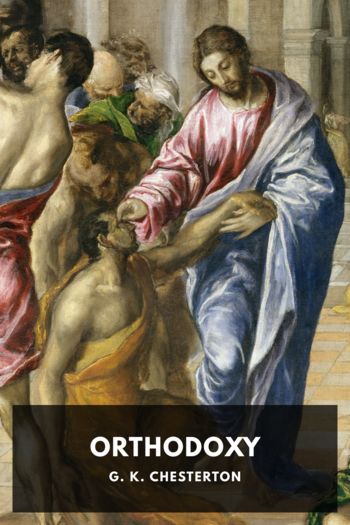Orthodoxy, G. K. Chesterton [best way to read e books txt] 📗

- Author: G. K. Chesterton
Book online «Orthodoxy, G. K. Chesterton [best way to read e books txt] 📗». Author G. K. Chesterton
Last and most important, it is exactly this which explains what is so inexplicable to all the modern critics of the history of Christianity. I mean the monstrous wars about small points of theology, the earthquakes of emotion about a gesture or a word. It was only a matter of an inch; but an inch is everything when you are balancing. The Church could not afford to swerve a hair’s breadth on some things if she was to continue her great and daring experiment of the irregular equilibrium. Once let one idea become less powerful and some other idea would become too powerful. It was no flock of sheep the Christian shepherd was leading, but a herd of bulls and tigers, of terrible ideals and devouring doctrines, each one of them strong enough to turn to a false religion and lay waste the world. Remember that the Church went in specifically for dangerous ideas; she was a lion tamer. The idea of birth through a Holy Spirit, of the death of a divine being, of the forgiveness of sins, or the fulfilment of prophecies, are ideas which, anyone can see, need but a touch to turn them into something blasphemous or ferocious. The smallest link was let drop by the artificers of the Mediterranean, and the lion of ancestral pessimism burst his chain in the forgotten forests of the north. Of these theological equalisations I have to speak afterwards. Here it is enough to notice that if some small mistake were made in doctrine, huge blunders might be made in human happiness. A sentence phrased wrong about the nature of symbolism would have broken all the best statues in Europe. A slip in the definitions might stop all the dances; might wither all the Christmas trees or break all the Easter eggs. Doctrines had to be defined within strict limits, even in order that man might enjoy general human liberties. The Church had to be careful, if only that the world might be careless.
This is the thrilling romance of Orthodoxy. People have fallen into a foolish habit of speaking of orthodoxy as something heavy, humdrum, and safe. There never was anything so perilous or so exciting as orthodoxy. It was sanity: and to be sane is more dramatic than to be mad. It was the equilibrium of a man behind madly rushing horses, seeming to stoop this way and to sway that, yet in every attitude having the grace of statuary and the accuracy of arithmetic. The Church in its early days went fierce and fast with any warhorse; yet it is utterly unhistoric to say that she merely went mad along one idea, like a vulgar fanaticism. She swerved to left and right, so as exactly to avoid enormous obstacles. She left on one hand the huge bulk of Arianism, buttressed by all the worldly powers to make Christianity too worldly. The next instant she was swerving to avoid an orientalism, which would have made it too unworldly. The orthodox Church never took the tame course or accepted the conventions; the orthodox Church was never respectable. It would have been easier to have accepted the earthly power of the Arians. It would have been easy, in the Calvinistic seventeenth century, to fall into the bottomless pit of predestination. It is easy to be a madman: it is easy to be a heretic. It is always easy to let the age have its head; the difficult thing is to keep one’s own. It is always easy to be a modernist; as it is easy to be a snob. To have fallen into any of those open traps of error and exaggeration which fashion after fashion and sect after sect set along the historic path of Christendom—that would indeed have been simple. It is always simple to fall; there are an infinity of angles at which one falls, only





Comments (0)